Civil Liberties, Criminalizing Dissent, Human Rights, Political Prisoner, Prison Industry, Truth to Power
Podcast: Play in new window | Download
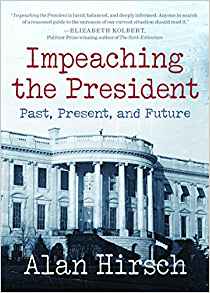
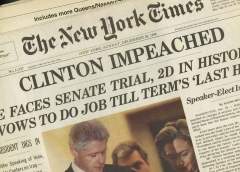
Impeaching the President: Past, Present and Future
Two U.S. presidents have been impeached: Andrew Johnson in 1868, and Bill Clinton in 1998. Richard Nixon would have been impeached but he resigned in 1974. Rumblings of impeaching the winner of the 2016 president elections even took place before the votes were in. Opponents of Hillary Clinton cited her use of a private e-mail server as Secretary of State as reason. Opponents of Donald Trump cited his business interests disqualified him. Possible criminal activities involving the Trump campaign added fuel to those calls.
Restraints on executive power exist because he greatest risk of tyranny comes from the executive branch. That’s partly because the president is a single person. In contrast, Congress and the Supreme Court must persuade a majority of their colleagues in order to act. As well, presidential authority as commander in chief includes the power to deploy weaponry as the head of the military and law enforcement.
The nation’s founding fathers value checks on tyranny. in part because of oppression by the British monarchy. At the Constitutional Convention some delegates opposed making one person responsible for executing the nation”s laws. While it decided in favor of a one-person executive, it adopted provisions aimed at preventing the president from becoming king-like.
Limits including four-year terms and voter approval to stay in office. The founders knew that even in four years the president could do much damage. So they created a mechanism for quicker replacement of the President if needed. The House of Representatives could “impeach” him, an accusation of wrongdoing that would prompt a trial in the Senate. If the Senate voted by two-thirds vote to convict the president, it would automatically result in removal from office. Impeachment can also be used to remove all federal officers.
Guest – Alan Hirsh, author of Impeaching the President: Past, Present and Future. Alan is a Lecturer in Humanities and Chair of Justice and Law Studies at Williams College. He’s also the author of For the People: What the Constitution Really Says About Your Rights and A Citizen’s Guide to Impeachment.
—-
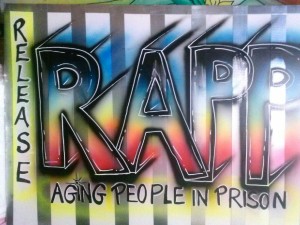
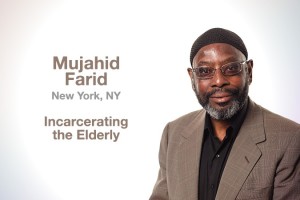
Remembering Mujahid Farid, Lead Organizer of Release Aging Persons in Prison
Today we remember and celebrate the life of Mujahid Farid who passed away last week in New York. Listeners will recall that Farid had been on Law and Disorder several times in the last few years, along with Laura Whitehorn and Dave George from his organization Release Aging Persons in Prison. In 1978, Farid was sentenced to 15 years to life in prison. He was 28 years old. He first became eligible for parole in 1993. He had earned four college degrees including two masters degrees while incarcerated. He was denied parole nine times. As we’ve discussed in prior segments, New York state parole commissioners denied his requests as with many others based on the nature of his crime rather than he many accomplishments he made while in prison.
In an article in the Village Voice, Farid noted that he asked the commissioners: “Is there anything I can do to make myself eligible for release?” He didn’t get a response but said he saw disapproving changes in the body language and facial expressions of the commissioners that his question wasn’t welcome. He was denied again. These denials added 18 years to his incarceration.
In 2011, Farid appeared before the parole boar for the tenth time. He stood before two new commissioners who had high rates of granting parole and that year, Farid was released. Farid became a 2013 Soros Justice Fellow. During his confinement, in 1987 Farid was part of a trio that created and proposed the first HIV/AIDS peer education program in New York State prisons, that later developed into the widely acclaimed state-wide program called PACE (Prisoners AIDS Counseling & Education). Farid participated in the creation of a college certificate program sponsored by New York Theological Seminary, and he taught introduction to sociology courses for people training for Alcohol and Substance Abuse (ASAT) counseling certification.
Since his release Farid initiated two programs designed to have an impact on dismantling mass incarceration: The RAPP Campaign and the Rise & Shine Small Business Coalition, the latter providing support for the creation and start-up of community businesses operating on principles of social entrepreneurship. In 2013 Farid was awarded a joint New York State legislative commendation for his community work and a Citizens Against Recidivism, Inc. award for social activism.
As listeners may recall, the number of people aged 50 and older in New York State, where RAPP was founded, has doubled since 2000; it now exceeds 10,000— which is about 20% of the total incarcerated population. This reflects a national crisis in the prison system and the extension of a culture of revenge and punishment into all areas of our society.
RAPP focuses on aging people in prison, many of whom are long-termers convicted of serious crimes. Many of these human beings have transformed their lives and developed skills and abilities they lacked before incarceration. They could be released from prison with little or no threat to public safety. Yet many are denied release, often for political reasons, and they needlessly remain imprisoned into old age. These elders could return to their communities if current mechanisms such as parole and compassionate release were correctly utilized.
Farid, you are in our thoughts and we send you our love.
Guest – Laura Whitehorn is a former political prisoner and native New Yorker, who was active in supporting groups such as the Black Panther Party, the Black Liberation Movement and was active with Students for a Democratic Society and the Weather Underground. Laura worked to help expose the FBI’s Counter Intelligence programs.
Guest – Mujahid Farid co-founded the Prisoners AIDS Counseling and Education program and helped design prison-based sociology and theology courses that allowed others to earn college-credited in prison. He also earned four college degrees and other certifications while incarcerated, including his paralegal certificate, NYS Department of Labor Certificate in Human Development Counseling, and NYC Department of Health Certificate in HIV/AIDS Counseling.
—————————-

—————————-
CIA Sponsored Terror, Civil Liberties, Habeas Corpus, Human Rights, Iraq War, Political Prisoner, Torture, Truth to Power, War Resister
Podcast: Play in new window | Download
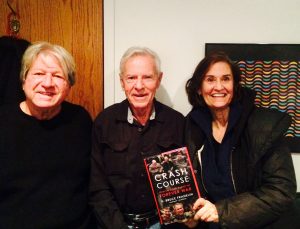

Crash Course : From the Good War to the Forever War
US Army Ranger turned conscientious objector Rory Fanning recently wrote in this in The Guardian newspaper: “Last week Sunday ,November 11, we celebrated Veterans Day. It used to be called Armistice Day and was a celebration of peace after the slaughter of World War One. Now it is called Veterans Day. The United States has 668 military bases around the globe. The United States has conducted military operations in 2/3 of the world’s countries since September 11, 2001. It has spent 3/4 of $1 trillion each year on it’s military – more than the next 13 countries combined. The US has taken hundreds of thousands of lives around the world these past 14 years and shows no signs of slowing down.“
Guest – H. Bruce Franklin, is one of America’s leading cultural historians, H. Bruce Franklin is the author or editor of nineteen books and more than 300 articles on culture and history published in more than a hundred major magazines and newspapers, academic journals, and reference works. He has given over five hundred addresses on college campuses, on radio and TV shows, and at academic conferences, museums, and libraries, and he has participated in making four films. He has taught at Stanford University, Johns Hopkins, Wesleyan, and Yale and currently is the John Cotton Dana Professor of English and American Studies at Rutgers University in Newark. Before becoming an academic, Franklin worked in factories, was a tugboat mate and deckhand, and flew for three years in the United States Air Force as a Strategic Air Command navigator and intelligence officer. Professor Franklin is touring the country to speak about his just publish book Crash Course : From the Good War to the Forever War.
—————————

—————————
Civil Liberties, Human Rights, Prison Industry, Supreme Court, Surveillance, Torture, War Resister
Podcast: Play in new window | Download
Update: Hosts Discuss U.S. Primary Election
—-
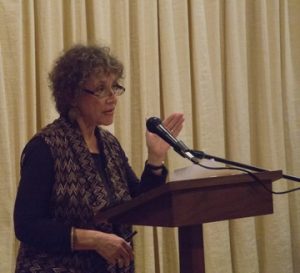
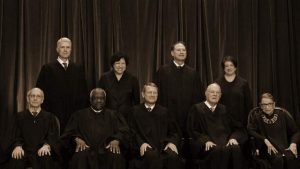
Trump’s Judges Imperil Our Rights for Decades
In less than two years, Donald Trump has two installed not one, but two, right-wing justices on the Supreme Court, ensuring a conservative majority for decades to come.
Republican congressional leadership appropriated (stole?) a high Court appointment from Barack Obama and appointed Neil Gorsuch. Gorsuch has cast the deciding vote in 14 cases that hurt workers, consumers, voters, immigrants and reproductive rights, while upholding abuses of government authority. Notably, he cast the deciding vote to uphold Trump’s Muslim travel ban in Trump v. Hawaii.
Republicans then pushed through the appointment of Brett Kavanaugh, who lied under oath and displayed conduct unbecoming a Justice. Just as Gorsuch has upheld the views of conservative Federalist Society and Heritage Foundation backers, Kavanaugh will surely do the same.
The public is less aware, however, of Trump’s systematic appointment of 29 right-wing judges on the federal circuit courts of appeals. And he hopes to appoint even more by year-end. These circuit court appointees have handed down regressive decisions favoring interests of the rich and upholding unlimited spending in politics. Judges who sit on the circuit courts wield enormous power because most cases are resolved at that level.
Seventh Circuit Judge Amy Coney Barrett, for example, voted in one case to allow a corporation to racially segregate its workplace. She also rejected the asylum claim of an immigrant who alleged he was tortured, without even considering the case merits. In the Sixth Circuit Judge Amul Thapar voted to allow public officials to lead Christian-only prayers at public Board of Commissioners meetings.
These decisions are just the tip of the iceberg.
Guest – Attorney Marjorie Cohn, professor emerita at Thomas Jefferson School of Law where she taught for 25 years. The former president of the National Lawyers Guild and criminal defense attorney is a legal scholar and political analyst who writes books and articles, and lectures throughout the world about human rights, US foreign policy, and the contradiction between the two. She has testified before Congress and debated the legality of the war in Afghanistan at the prestigious Oxford Union. Her columns appear on Truthout, HuffPost, JURIST, Truthdig, Portside, Alternet, CommonDreams and Consortium News, and she has provided commentary for CBS News, BBC, MSNBC, CNN, Fox News, NPR and Pacifica Radio. Her website is http://marjoriecohn.com/
—-


The Nature of American Fascism
One hundred and eleven years ago American socialist and famed novelist Jack London in his book “The Iron Heel” anticipated what we are seeing developing in the USA today. He wrote “There is a shadow of something colossal and menacing that even now is beginning to fall across the land. Call it the shadow of an oligarchy if you will; it is the nearest I dare approximate it. What its nature may be I refuse to imagine. But what I wanted to say was this: you are in a perilous position.“
With our experience with fascism in the 20th century in Germany and Italy and with what we see developing in the USA right now we can clearly imagine what American fascism would look like.
– Socialism would be illegal and it’s proponents imprisoned
– Labor unions would be totally illuminated as an organization for those without property
– Quality public education would be further reduced
– The independence of public universities would be totally undermined
– Billions of dollars would continually being devoted to slick propaganda
– Much of traditional government functions with the exception of the police and the armed forces would be privatized
– The media and the Internet would be put under direct government control
– Minorities, blacks, Muslims, Jews, Mexicans, and LBGTQ people would be scapegoated for societies’ills.
– Women would be denied control over their own bodies
– Church and state would no longer be separated
– The rule of law would be cast aside.
Fascism doesn’t just doesn’t descend on us all at once like the falling of a dark curtain. It creeps in. It has been creeping in over the last 40 years of neoliberalism and with the rise of the ultra right who have taken over the Republican Party. All this was topped off to years ago with the election of Trump. In the last two weeks it has gotten even worse. Two black people were assassinated in Kentucky, 11 Jews were slaughtered inside there Pittsburgh synagogue, Trump canceled a nuclear non-proliferation pact with Russia, he declared himself a nationalist, really a white nationalist, and then sent 14,000 troops to the Mexican border to prevent desperate mostly women and children walking north from Honduras from claiming their lawful ride to asylum, and then he threatened to cancel birthright citizenship, a right guaranteed by the 14th amendment to our constitution.
We know which fascism looks like. We have identified it. But what do we do to fight it?
Guest – Barry Sheppard, is a political writer from Oakland California, a longtime socialist, activist, and author. Contact email: Lundshep@att.net
————————–

————————–
CIA Sponsored Terror, Civil Liberties, Criminalizing Dissent, Guantanamo, Military Tribunal, Political Prisoner, Prison Industry, Targeting Muslims, Torture
Podcast: Play in new window | Download
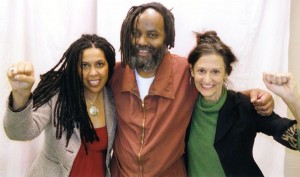
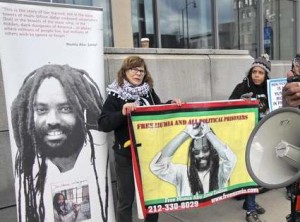
Mumia Abu-Jamal Update October 2018
Last week, attorneys for Mumia Abu Jamal argued in court that conflicts of interest led to unfair rulings against him in his longstanding case. As many know, Abu-Jamal was sentenced to death for the 1981 killing of Philadelphia police officer Daniel Faulkner. The case was riddled with constitutional violations, and his sentence was later commuted to life in prison without parole.
Recently, in the wake of the U.S. Supreme Court’s decision in Williams v. Pennsylvania, Mumia’s attorneys argued that his rights were violated after former district attorney Ron Castille failed to recuse himself in an appeals decision. At the time Castille was a state Supreme Court judge.
Judge Leon Tucker had asked the Philadelphia district attorney’s office to produce an internal memo that might show Castille— back when he was city district attorney — had direct involvement in pursuing Abu-Jamal’s death sentence. If he did, his later denial as Supreme Court justice of Abu-Jamal’s appeal, could be deemed biased.
Defense attorney Judy Ritter said: “Justice Castille has shown himself to be involved in this case, to be biased against a certain class of cases that our client falls into.” The Commonwealth argued that as district attorney, Castille was simply doing his job.
“It’s nothing remarkable that a DA would send a letter to the governor asking him to sign death warrants which the governor was required to do,” said attorney Tracey Kavanaugh. Emotions ran high, both inside and outside of the courtroom. Maureen Faulkner, the widow of Daniel Faulkner, stood up and cried in the middle of court proceedings when the judge announced that both sides would need to wait until December for any possible closure in the case. Presiding Judge Leon Tucker has indicated that he will make a ruling in the case some time after December 3, 2018.
Guest – Professor Johanna Fernandez, is a native New Yorker. She received a PhD in History from Columbia University and a BA in Literature and American Civilization from Brown University. Professor Fernández teaches 20th Century U.S. History, the history of social movements, the political economy of American cities, and African-American history. She has previously taught at Carnegie Mellon University in Pittsburg, PA and Trinity College in Hartford, CT and is, most recently, the recipient of a Fulbright Scholars grant to the Middle East and North Africa that will take her to Jordan in spring 2011, where she will teach graduate courses in American History. She is with the Campaign to Bring Mumia Home.
—-


In Response to Pittsburgh, We Must Come Together as One
Last week, acts of hatred claimed the lives of 13 innocent persons in the United States. A white supremacist killed two African American persons in Kentucky. An anti-semite killed 11 Jewish persons in a synagogue in Pittsburgh where even more were wounded, including first responders and police officers.
Not surprisingly, the slaughter of the 11 Jews brought forth calls of the need for a strong Israel; the same response that followed anti-Semitic killings in France and Brussels.
It also inflamed political and theological differences between Israelis and American Jews. Israel’s Ashkenazi chief rabbi avoided saying “synagogue” because it is not Orthodox, but Conservative, a liberal branch of Judaism — because it is not Orthodox, but Conservative, one of the liberal branches of Judaism rejected by religious authorities who define the state’s Jewishness.
The attacker’s anti-refugee, anti-Muslim rants prompted some on the Israeli left — like many American Jewish liberals — compare the views of nationalistic leaders who influence their governments.
In Israel, longstanding animosity between left and right has escalated. Orthodox parties are hoping to increase their influence and Jewish law on day to day life; disputes about who cdan serve in the military and what stores can open on the Sabbath are rampant.
Guest – Phyllis Bennis is a fellow of the Institute for Policy Studies, where she works on anti-war, US foreign policy and Palestinian rights issues. She has worked as an informal adviser to several key UN officials on Palestinian issues. Her books including Calling the Shots: How Washington Dominates Today’s UN, and Understanding the Palestinian-Israeli Conflict.
—-

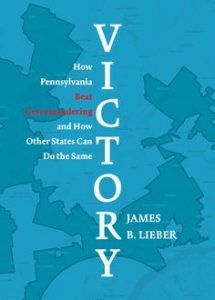
VICTORY: How Pennsylvania Beat Gerrymandering and How Other States Can Do the Same
An important victory against gerrymandering was recently won in the State of Pennsylvania in the case of League of Women Voters of Pennsylvania v. Commonwealth of Pennsylvania.
The first paragraph of the complaint lays it out. “This case is about one of the greatest threats to American democracy today: partisan gerrymandering. A partisan gerrymandering occurs when the political party in control of redistricting redraws congressional or state legislative districts to entrench that party in power and prevent voters affiliated with the minority party from electing candidates of their choice. The result is that general election outcomes are rigged – they are predetermined by partisan actors sitting behind a computer, and not by the voters.“
In Pennsylvania although the Democrats have more supporters than the Republicans Republicans had 13 seats in the US Congress and the Democrats had only five.
The U. S. Supreme Court has not been willing to rule on gerrymandering taking the position that there is no clear way to determine if there has been gerrymandering and therefore it is a non-judicable issue.
To get around this in 2018 Pennsylvania activists engineered a brilliant legal effort in the the state courts of Pennsylvania to attack the lopsided redistricting, and won after fighting pitched battles all the way up to the state Supreme Court. Now activists around the country can do the same. The next congressional redistricting occurs after the 2020 census: progressive need to be ready well before then.
We speak today with constitutional litigator James R. Lieber who has provided a real time report on effective trial lawyers, working to facilitate the will of the people. He explains the strategies of counsel and the evidence presented and has provided a roadmap to social justice litigants for pursuing constitutionally protected claims in state court based on the state constitution and avoiding federal review.
Guest – Attorney James B. Lieber is the author of 3 previous books, and a lawyer who focuses on constitutional, civil rights, and discrimination cases. He has won two cases before the U. S. Supreme Court and is widely published in magazines of national stature.
—————————————–

—————————————–
















